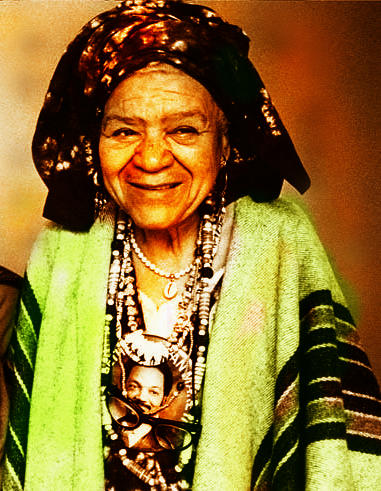During her decades as a leader in the American civil rights movement, Queen Mother Moore was known as the “Mother of Reparations” because of her passion for seekingcompensation for the wrongs of the past. Reparationscan include direct financial compensation or other forms of aid, and Moore – born Audley Moore in Louisiana on July 27, 1898–spent her life seeking reparations for slavery and other racially motivated injustices and fighting for tenants’ rights and education for the poor.
Born in Louisiana on July 27, 1898, Audley Moore’sfamily history was scarred by the horrors of slavery. From the fourth grade on, Moore had to take on adult responsibilities to protect her family after the death of her parents. That tragedy, the awareness of her family’s history, and her drive to learn about the realities of slavery even generations in the past may have helped her develop her motto:"There was nothing left to do but struggle."She struggled over her lifetime to help others to raise their voices and raise the veil that hides racism.
Looking back from 2017, we sometimes forget that the struggle for racial equality has always included more than mere words and votes. It has always required marching, speech making, and sometimes more.
Just over 100 years ago, on July 8, 1917, when Moore was still a teenager, she took two .38 specials with her to helpdefendJamaican political leader Marcus Garvey’s speech in New Orleans. The police wanted no attention drawn to their city after the East St. Louis Riot, one of the deadliest race riots in American history. After brutal attacks by white citizens and police alike, many people who knew that silence would be the worst reaction feared for Garvey’s and others’ lives. Luckily, no guns were used during his speech.
Moved by Garvey’s speech, Moore moved to New York’s Harlem in 1922 to become a member and then leader of his Universal Negro Improvement Association.She joined several organizations while in New York, but came into her own when she returned home to Louisiana in 1955 and created the Universal Association of Ethiopian Women (UAEW) in 1957she returned home to Louisiana in 1955 and created the Universal Association of Ethiopian Womenin 1957. The group campaigned for national reparations on behalf of the descendants of the slaves who built much of the nation with minimal economic compensation and credit for their work. By 1962, Moore had moved to Philadelphia to head the National Emancipation Proclamation Observance Committee and continue the push for reparations.
Moore also spoke out for education of the poor and for the rights of tenants throughout her decades in Harlem, where she returned to live in the 1960s.
One of her most famous speeches, at Greenhaven Prison, survives on video. Similar to the 1917 Garvey speech at which she stood up, her 1973 Greenhaven appearance followed riots and murders in Attica, New York, just two years before. If Moore felt tired of the struggle, her speech was full of fight.
It was during her 1972 trip to honor deceased former Ghanaian President Kwame Nkrumah that she was given the honorary title “Queen Mother” by the Ashanti, a people directly tied to the slave trade for over a century.Moore never discussed the Ashanti’s hand in the African Diaspora; her focus by that time was on Pan-Africanism and Nkrumah’s role as the founder oftheConvention People’s Party. Ghana could be seen an example of the ability of a colonialized people claiming their independence.
This quote from Queen Mother Moore, expanding on a paraphrase of Benjamin Franklin, should inspire current and future generations to continue with the struggle for justice and equality.
"Those who seek temporary security rather than basic liberty deserve neither … We began to talk about wanting to be first class citizens. We didn't want to be second class citizens. You would have sworn that second class was in the Constitution. Also that citizenshave to fight for rights. Imagine a citizen having to fight for civil rights! The very thought of it is repulsive. And I resent it and I reject this citizenship that was imposed on me. From the bottom of my heart I reject it. This is the thing that motivates me and keeps me going."


